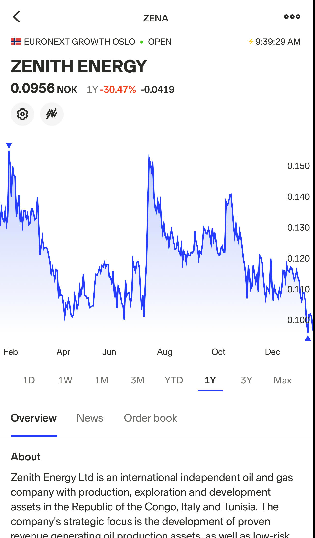Jump to page sections
Zenith Energy as a Possible Investment
Initial date of publishing: 2022-01-31.
Here is a brief summary of pros and cons for the stock Zenith Energy Ltd. "Zenith Energy"/ZENA on Oslo Stock Exchange (OSE / Oslo Børs) and the London Stock Exchange. One of the (former?) board members is Norwegian, hence the reason why it's on OSE.
Friendly tip: Don't put in more than you can afford to lose. This post comes with a big WARNING sign attached.

Cons
- The stock is subject to attention from a circle of investors, making it potentially behave extra irrationally. "Stupid investors". This stock is currently not ruled by "smart money".
- Quite frequent share issues that water out the stock. (Norwegian: "emisjon".)
- Low liquidity.
- High volatility.
- Questionable morals in the leadership.
- Very high risk.
- Irrational behavior in the stock.
- The stock is subject to heavy speculation.
- You can lose most, or all, of your money.
- They operate in Africa (Tunisia and the Republic of the Congo) with the increased risk this continent typically represents. Conditions and terms are not necessarily always orderly.
- They still have not acquired a license in the Republic of the Congo. No oil there yet. It has been pending for a year and a half.
- The Tunisian government is taking long (years) to decide/approve licenses and purchases of (parts of) fields.
- They have some risky plans in Nigeria. A quite mismanaged African country.
- This is both a pro and a con: It's a penny stock.
Pros
- The stock is potentially undervalued, has a bad reputation, and is somewhat ridiculed. You can argue that there's an "upside" in the stock.
- Their production cost for one barrel of oil is about 20 USD. Oil price at the time of writing is well over 80 USD, meaning a 60+ USD margin.
- A pessimistic estimate is that they produce about 500 barrels per day, a little more, based on their reports. This means they have started to make money. $60 * 500 = 30,000 USD per day, simplifying grossly. Based on weekly production numbers from Tunisia, the average for 1 year is 539 barrels a day. You should know: According to the CEO, they need to "fill a ship" before they sell, so the oil price at any given moment is not relevant.
- They make steady, good money from gas in Italy. With gas prices as of January 2022, this is very good business at the moment. The last 4 months, Zenith has made in excess of 200,000 Euro per month, net.
- Their CEO, Mr. Andrea Cattaneo Della Volta Cattaneo Adomo, appears to have many connections around the globe, facilitating making deals and getting funding.
- Share issues appear to be for reasons, such as developing the company and investing in growth. Plus, investors have backed up the subscriptions of new shares / share issues. The last share issues were backed by Norwegian and British investors.
- Potentially high rewards.
- They have actual production and sales of oil barrels. They are making money today.
- Possibly an unrealized potential for growth from the current 168 million NOK (Norwegian kroner) in market cap value.
- If Zenith acquires the license in the Republic of the Congo, they will potentially increase production with somewhere around 1000-5000 barrels over time. This is more speculative, but acquiring the Congo license would be good news for Zenith.
- On October 25, 2021, Zenith announced that they successfully drilled in a location where nothing had happened since 2012. This increased production from about 80 to 120 barrels. The management is hoping for about 20 % higher production by performing similar "workover" drillings.
- This is both a pro and a con: It's a penny stock.

General Considerations/Facts
Zenith Energy owns shares of fields. The fields' total production of oil barrels is higher than that which Zenith manages.
Zenith Energy is planning to purchase 22.5 % of an oil field in Tunisia (Sidi El Kilani), but the Tunisian government has spent 1.5 years without yet having approved the purchase.
Zenith currently owns 22.5 % of the Sidi El Kilani field through another company that they bought shares in, which is now a daughter company of Zenith Energy. The Tunisian government did not allow a direct purchase of shares of the oil field, so Zenith Energy bought the owner company.
Finance Finans Stocks Aksjer InvestingBlog articles in alphabetical order
A
- A Look at the KLP AksjeNorden Index Mutual Fund
- A primitive hex version of the seq gnu utility, written in perl
- Accessing the Bing Search API v5 using PowerShell
- Accessing the Google Custom Search API using PowerShell
- Active directory password expiration notification
- Aksje-, fonds- og ETF-utbytterapportgenerator for Nordnet-transaksjonslogg
- Ascii art characters powershell script
- Automatically delete old IIS logs with PowerShell
C
- Calculate and enumerate subnets with PSipcalc
- Calculate the trend for financial products based on close rates
- Check for open TCP ports using PowerShell
- Check if an AD user exists with Get-ADUser
- Check when servers were last patched with Windows Update via COM or WSUS
- Compiling or packaging an executable from perl code on windows
- Convert between Windows and Unix epoch with Python and Perl
- Convert file encoding using linux and iconv
- Convert from most encodings to utf8 with powershell
- ConvertTo-Json for PowerShell version 2
- Create cryptographically secure and pseudorandom data with PowerShell
- Crypto is here - and it is not going away
- Crypto logo analysis ftw
D
G
- Get rid of Psychology in the Stock Markets
- Get Folder Size with PowerShell, Blazingly Fast
- Get Linux disk space report in PowerShell
- Get-Weather cmdlet for PowerShell, using the OpenWeatherMap API
- Get-wmiobject wrapper
- Getting computer information using powershell
- Getting computer models in a domain using Powershell
- Getting computer names from AD using Powershell
- Getting usernames from active directory with powershell
- Gnu seq on steroids with hex support and descending ranges
- Gullpriser hos Gullbanken mot spotprisen til gull
H
- Have PowerShell trigger an action when CPU or memory usage reaches certain values
- Historical view of the SnP 500 Index since 1927, when corona is rampant in mid-March 2020
- How Many Bitcoins (BTC) Are Lost
- How many people own 1 full BTC
- How to check perl module version
- How to list all AD computer object properties
- Hva det innebærer at særkravet for lån til sekundærbolig bortfaller
I
L
M
P
- Parse openssl certificate date output into .NET DateTime objects
- Parse PsLoggedOn.exe Output with PowerShell
- Parse schtasks.exe Output with PowerShell
- Perl on windows
- Port scan subnets with PSnmap for PowerShell
- PowerShell Relative Strength Index (RSI) Calculator
- PowerShell .NET regex to validate IPv6 address (RFC-compliant)
- PowerShell benchmarking module built around Measure-Command
- Powershell change the wmi timeout value
- PowerShell check if file exists
- Powershell check if folder exists
- PowerShell Cmdlet for Splitting an Array
- PowerShell Executables File System Locations
- PowerShell foreach loops and ForEach-Object
- PowerShell Get-MountPointData Cmdlet
- PowerShell Java Auto-Update Script
- Powershell multi-line comments
- Powershell prompt for password convert securestring to plain text
- Powershell psexec wrapper
- PowerShell regex to accurately match IPv4 address (0-255 only)
- Powershell regular expressions
- Powershell split operator
- Powershell vs perl at text processing
- PS2CMD - embed PowerShell code in a batch file
R
- Recursively Remove Empty Folders, using PowerShell
- Remote control mom via PowerShell and TeamViewer
- Remove empty elements from an array in PowerShell
- Remove first or last n characters from a string in PowerShell
- Rename unix utility - windows port
- Renaming files using PowerShell
- Running perl one-liners and scripts from powershell
S
- Sammenlign gullpriser og sølvpriser hos norske forhandlere av edelmetall
- Self-contained batch file with perl code
- Silver - The Underrated Investment
- Simple Morningstar Fund Report Script
- Sølv - den undervurderte investeringen
- Sort a list of computers by domain first and then name, using PowerShell
- Sort strings with numbers more humanely in PowerShell
- Sorting in ascending and descending order simultaneously in PowerShell
- Spar en slant med en optimalisert kredittkortportefølje
- Spre finansiell risiko på en skattesmart måte med flere Aksjesparekontoer
- SSH from PowerShell using the SSH.NET library
- SSH-Sessions Add-on with SCP SFTP Support
- Static Mutual Fund Portfolio the Last 2 Years Up 43 Percent
- STOXR - Currency Conversion Software - Open Exchange Rates API
